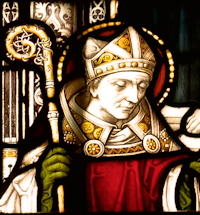Easter: May 28th
Wednesday of the Sixth Week of Easter; Minor Rogation Day
Other Commemorations: St. Germanus, Bishop (RM); Bl. Margaret Pole, Mother and Martyr (RM)
» Enjoy our Liturgical Seasons series of e-books!
The Roman Martyrology commemorates St. Germanus of Paris (496-576), Bishop of Paris in 555. He was renowned for his miracles which were recorded by Bishop Fortunatus.
Blessed Margaret Pole (1473-1541) is also commemorated. She was born Margaret Plantagenet, the niece of Edward IV and Richard III. She married Sir Reginald Pole about 1491 and bore five sons, including Reginald Cardinal Pole. Margaret was widowed, named countess of Salisbury, and appointed governess to Princess Mary, daughter of Henry VIII and Queen Catherine of Aragon, Spain. She opposed Henry's marriage to Anne Boleyn, and the king exiled her from the court, although he called her "the holiest woman in England." When her son, Cardinal Pole, denied Henry's Act of Supremacy, the king imprisoned Margaret in the Tower of London for two years and then beheaded her on May 28. In 1538, her other two sons were executed. She was never given a legal trial. She was seventy when she was martyred. Margaret was beatified in 1886.
Today also marks the final day of the traditional observance of the Minor Rogation Days, which fall Monday through Wednesday preceding Ascension Thursday. Each of these days has a traditional Station Church.

Minor Rogation Days
Monday, Tuesday and Wednesday before the Ascension we commemorate the traditional dates for the Minor Rogation Days. These are days of prayer and formerly fasting, which take place every year on April 25th and the three days preceding the feast of the Ascension, the former being known as the Major Rogation and the latter as the Minor Rogations. The word “rogation” has its origins in the Latin word rogare, which means to supplicate or ask, and the purpose of Rogation Days is to beg God for His mercy, to turn away His anger, and to ask Him to bless the produce of field and garden while protecting us from natural disasters. The Rogation Days no longer appear on the General Roman Calendar, but are celebrated according to the local conference of bishops.
In the ancient Church Rogation days were quite common; some recurred annually, others were introduced at times of particular need, e.g., averting war or pestilence. The practice of three Rogation days before the feast of Christ's Ascension originated in Gaul (modern France). The saintly bishop Mamertus of Vienne introduced these days of prayer and penance when catastrophe threatened the city and its neighborhood about the year 450 A.D. Quickly the custom spread, and eventually it was incorporated into the liturgy of the Western Church.
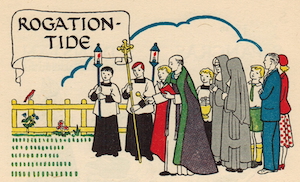
The celebration of Rogation Days consists in a procession followed by the Rogation Mass. In this procession we may sense the last remnant of the obsolete station processions observed by ancient Christians almost daily during Lent and during the first week after Easter. They would gather in a church known as the ecclesia collecta (hence the word "Collect") and from there walk in procession with the bishop and clergy to another church singing the Litany of the Saints and the Kyrie. The place of destination was known as the statio or station church, and holy Mass was celebrated there.
The four Rogation days have preserved the main elements of this venerable rite, an observance that we should respect and foster. For we should pray both perseveringly and in common, since special efficacy and power is attached to such prayer. Our prayer should not only be sincere and personal, we should also pray as units of a community, for to this type of prayer a special efficacy is attached. In the Rogation procession the Litany of the Saints is recited; it gives us an opportunity to call upon the entire Church triumphant to intercede in our behalf. The prayers concluding the Litany are usually beautiful and edifying.
What petitions will surely be answered?
Those which, according to Christ's words, are made in "the right spirit," and which are offered in the Name of Jesus, i.e., tend to further the kingdom of God. In the "Our Father" Christ has given us a summary of such petitions. Therefore, if our wishes are similar to those in the Lord's Prayer, we can assume that they will be heard. These petitions fall under three headings: God's kingdom, daily bread, sin. God will certainly grant petitions of this kind.
—Excerpted from The Church's Year of Grace, Pius Parsch
Highlights and Things to Do:
- Rogation Days: Cross Days (Activity)
- Rogation Day Prayers (Prayer)
- Read more about the Rogation Days at Catholic Saints Info.
- For more see Rogation Days.
The Third Rogation Day
We keep the third and last of the Rogation Days with our pastor, St. Peter. With profound reverence and filial devotion we will chant today the invocation: "Sancte Peter, ora pro nobis." Great is St. Peter's joy whenever the Church Militant calls upon his triumphant lambs and sheep, the apostles and martyrs, the pontiffs and confessors, the virgin and widows and all the saints, the glorious flock which the keybearer of heaven has already admitted to his Master in glory seated at the right hand of the Father. We salute thee, blessed Peter, immovable rock of the Church and shepherd of our souls. We entrust ourselves anew to thee, in soul and body. Pray the eternal Father that He would bless the holy, Catholic Church, grant her peace, protect, unite and govern her throughout the world, together with our holy Father, Pope N., our Bishop N., and all true believers and promoters of the Catholic and apostolic faith (Canon). St. Peter, pray for us.
Meditation for Wednesday of the Sixth Week of Easter, Vigil of the Ascension
Final Minor Rogation Day: Before the gates of the Father
1. Today we live with our Lord and Savior. The thought that concerns Him most today is the realization: "I come to Thee," to the Father. The Son knocks at the door of the Father and begs admission for Himself and for His disciples.
2. "Father, the hour is come; glorify Thy Son, that Thy Son may glorify Thee. . . . I have glorified Thee on earth: I have finished the work which Thou gavest Me to do; and now glorify Thou Me, O Father, with Thyself, with the glory which I had before the world was" (Gospel). Christ asks His Father to let His human nature share in that glory which He posessed as the Son of God from all eternity. How completely He has humbled Himself! Although He was God, at the moment of His incarnation He took on our lowly human nature and "emptied Himself taking the form of a servant…He humbled Himself, becoming obedient unto death, even to the death of the cross" (Phil. 2:7 f.). By a life of poverty, humility, and suffering, and by complete subjection to the will of the Father, He has fulfilled the task which was given to Him. Now He returns to the Father, and we share His feelings and His joy. We join in His prayer to the Father: "Father,... glorify Thy Son" as He has glorified Thee. Give also to His humanity the glory that is justly His. Exalt Him above the world and above the highest heavens. Take Him to Thyself and set His throne at the right hand of Thy majesty. Let the scepter of His power extend to the ends of the earth. Let Him rule in the human nature He has assumed as King and Master, and let every knee bow to Him, "of those that are in heaven, on earth, and under the earth" (Phil. 2:10). Let His name and His gospel be made known to all mankind. Let all men be incorporated in Him, that they may feel the power of His salvation and may be saved through Him. Prepare for Him a spouse pure and spotless, a holy and blessed Church. Make that Church holy, universal, mighty, and invincible. Give Him power over souls, over hearts, over peoples, and over all ages. Let all offer sacrifice to Him, and may He extend His sway over all men. May He save all men and dive them life that they may possess it in its fullness.
"I have manifested Thy name to the men whom Thou hast given Me out of the world. Thine they were, and to Me thou gavest them, and they have kept Thy word. Now they have known that all things which Thou hast given Me are from Thee; because the words which Thou gavest Me, I have given to them; and they have received them, and they have known in very deed that I came out from Thee, and they have believed that Thou didst send Me. I pray for them; I pray not for the world, but for them whom Thou hast given Me; because they are Thine and all My things are Thine, and Thine are Mine" (Gospel). We belong to Him as the members of the body belong to the head. He cannot go to His Father without us. He desires that we, His brothers, share in His eternal inheritance. "I pray for them ... whom Thou hast given Me." He prays for us because we have been united to Him through our baptism, through our daily Holy Communion. How shall we measure this ineffable love of the Savior? How intense is His desire that the gates of heaven be opened to all men, and that in the mansion of His heavenly Father a place be prepared for us! O Lord I believe in You, and I trust and confide entirely in You.
3. "Declare it with the voice of joy and let it be heard, alleluia; declare it even to the ends of the earth: The lord hath delivered His people, alleluia, alleluia" (Introit). We have been delivered. He will take us with Him to His Father. "Shout with joy to God, all the earth, sing ye a psalm to His name; give glory to His praise. Glory be to the Father and to the Son and to the Holy Ghost" (Introit). The Lord has delivered His people. He goes now to prepare a place for them in heaven, and very soon we shall join Him there. "It is truly meet and just, right and profitable to salvation, to extol Thee indeed at all times, O Lord, but especially with the highest praise to magnify Thee at this time, when Christ our Pasch was sacrificed. For He is the true lamb who hath taken away the sins of the world. Who by dying hath overcome our death, and by rising again hath restored our life" (Preface for Easter). We have been delivered.
"Sing ye to the Lord, alleluia; sing unto the Lord and bless His name; show forth His salvation from day to day, alleluia, alleluia" (Communion). Praise Him from day to day for the work of salvation which He has accomplished for us, and which He will one day bestow on us at our entrance into heaven.
—Benedict Bauer, O.S.B, from The Light of the World, Vol II
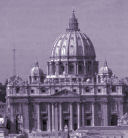
Wednesday of the Sixth Week of Easter, Wednesday of the Lesser Rogation Days
Station with San Pietro in Vaticano (St. Peter's in the Vatican):
Today is the third and last Rogation day. If possible we will take part in the ancient and venerable station procession and in chanting the Litany of the Saints. In spirit we will feel ourselves present within the stational church of St. Peter at Rome, and in union with all Christendom celebrate the Rogation Mass.
For more on San Pietro in Vaticano, see:
For further information on the Station Churches, see The Stational Church.
St. Germanus
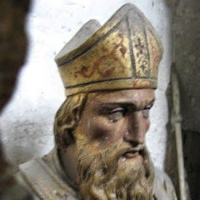 St. Germanus, the glory of the Church of France in the sixth century, was born in the territory of Autun, about the year 496. In his youth he was conspicuous for his fervor. Being ordained priest, he was made abbot of St. Symphorian's; he was favored at that time with the gifts of miracles and prophecy. It was his custom to watch the great part of the night in the church in prayer, whilst his monks slept.
St. Germanus, the glory of the Church of France in the sixth century, was born in the territory of Autun, about the year 496. In his youth he was conspicuous for his fervor. Being ordained priest, he was made abbot of St. Symphorian's; he was favored at that time with the gifts of miracles and prophecy. It was his custom to watch the great part of the night in the church in prayer, whilst his monks slept.
One night, in a dream, he thought a venerable old man presented him with the keys of the city of Paris, and said to him that God committed to his care the inhabitants of that city, that he should save them from perishing.
Four years after this divine admonition, in 554, happening to be at Paris when that see became vacant on the demise of the Bishop Eusebius, he was exalted to the episcopal chair, though he endeavored by many tears to decline the charge. His promotion made no alteration in his mode of life. The same simplicity and frugality appeared in his dress, table, and furniture. His house was perpetually crowded with the poor and the afflicted, and he had always many beggars at his own table. God gave to his sermons a wonderful influence over the minds of all ranks of people; so that the face of the whole city was in a very short time quite changed.
King Childebert, who till then had been an ambitious, worldly prince, was entirely converted by the sweetness and the powerful discourses of the Saint, and founded many religious institutions, and sent large sums of money to the good bishop, to be distributed among the indigent.
In his old age St. Germanus lost nothing of that zeal and activity with which he had filled the great duties of his station in the vigor of his life; nor did the weakness to which his corporal austerities had reduced him make him abate anything in the mortifications of his penitential life, in which he redoubled his fervor as he approached nearer to the end of his course. By his zeal, the remains of idolatry were extirpated in France.
The Saint continued his labors for the conversion of sinners till he was called to receive the reward of them, on the 28th of May, 576, being eighty years old.
—Excerpted from The Daily Gospel
Highlights and Things to Do:
- Read more about St. Germanus:
- Read about the oldest church in Paris, Abbaye de St Germain-des-Près.
Bl. Margaret Pole
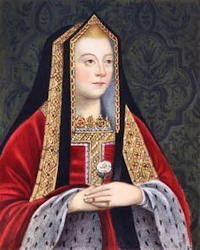 Margaret was born into the ruling dynasty in 1473, at Farleigh Hungerford, in Somerset. Her father, the Duke of Clarence, was brother to both Edward IV and Richard III. This meant that all her life she was seen as a threat to the ruling monarchs, as she had a legitimate claim to the throne and was therefore a potential figurehead in any revolt against the crown. Indeed as soon as the Tudors came to power they imprisoned Margaret's brother, the Earl of Warwick, and eventually executed him.
Margaret was born into the ruling dynasty in 1473, at Farleigh Hungerford, in Somerset. Her father, the Duke of Clarence, was brother to both Edward IV and Richard III. This meant that all her life she was seen as a threat to the ruling monarchs, as she had a legitimate claim to the throne and was therefore a potential figurehead in any revolt against the crown. Indeed as soon as the Tudors came to power they imprisoned Margaret's brother, the Earl of Warwick, and eventually executed him.
The Tudors sought to defuse her potential threat by keeping her close to them, marrying her to Sir Richard Pole, who was related to Henry VII, and keeping her close at court. Margaret became lady in waiting to Catherine of Aragon, beginning a lifelong friendship, and she became governess to Princess Mary, the daughter of Henry VIII and Catherine.
At first Henry favoured Margaret, restoring to her lost family lands and titles, but this came to an end at the time of his divorce from Catherine. Her loyalty to Catherine, and to Mary, as well as to her Catholic faith, brought her into conflict with the King at the time of his divorce and remarriage to Anne Boleyn. If her own opposition to Henry’s behaviour, and her position as a possible contender for the throne when the Tudor dynasty was looking shaky were not enough, her son Reginald Pole was needling the King from overseas and encouraging opposition to him. This made Margaret’s position very dangerous indeed.
Although the King described her as ‘the holiest woman in England’ she was arrested on the grounds of treason, and imprisoned for some time at Cowdray in 1538-9, although she never faced trial and there was no credible evidence against her. In spite of this she was executed in 1541, at the age of 70. Reportedly the inexperienced executioner took ten blows to sever her head.
When her son Reginald Pole, now a cardinal, heard of his mother's death, he is reported to have said: "Hitherto I have thought myself indebted to the divine goodness for having received my birth from one of the most noble and virtuous women in England; but from henceforth my obligation will be much greater, for I understand that I am now the son of a martyr. May God be thanked and praised. We must rejoice, because now we have one more patron to intercede for us in Heaven."
Margaret Pole was beatified with other martyrs of penal times in 1886.
Highlights and Things to Do:
- Read more about Bl. Margaret:


